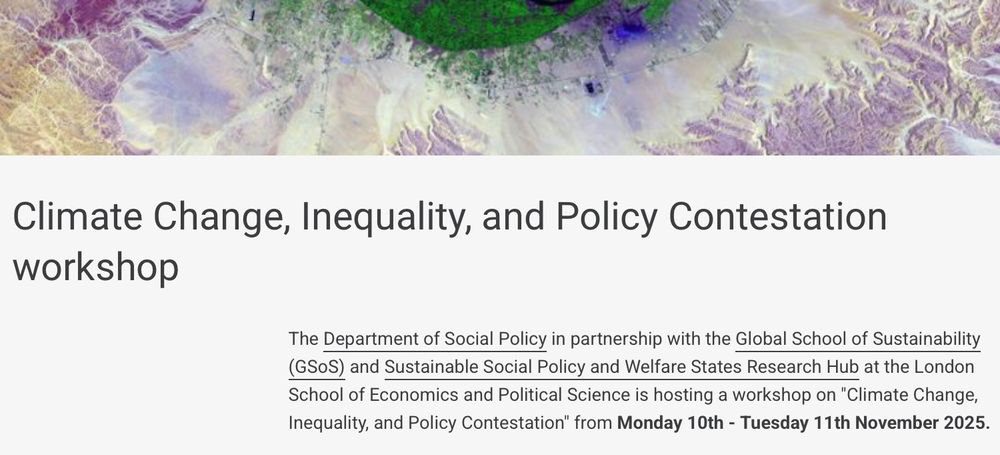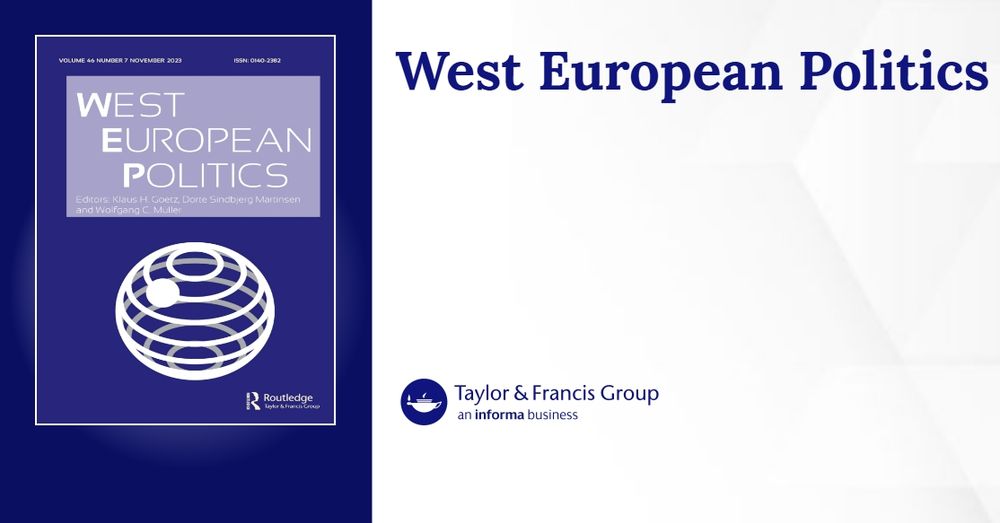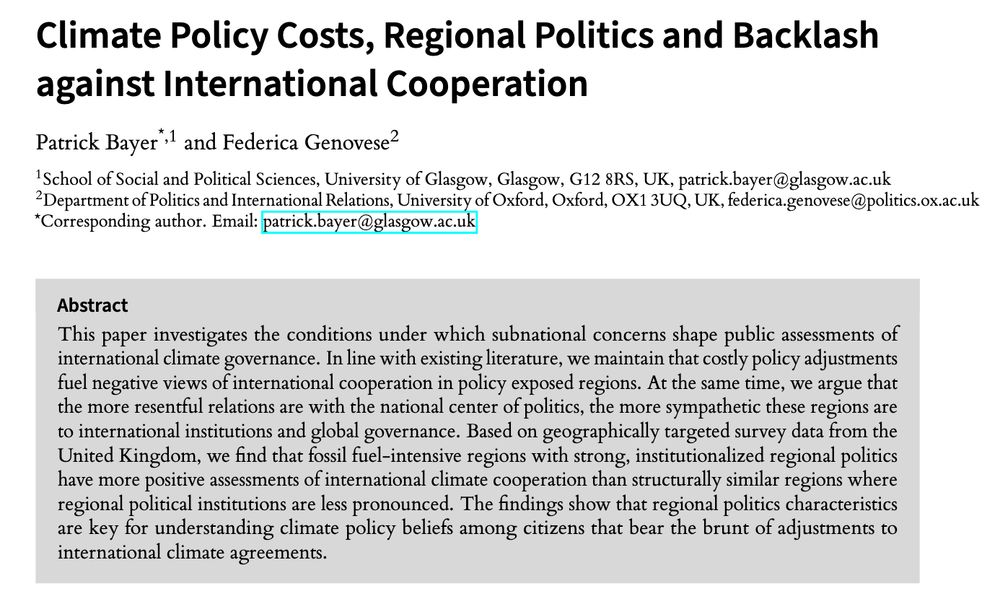🌍 Researching climate policy & public opinion
📊 Research-based insights | Methods | AI & teaching
🌐 liambeisermcgrath.com
🔗 https://linktr.ee/liambeisermcgrath
Energy insecurity doesn't just affect energy policy preferences—it spills over into climate and social policy support too.

Energy insecurity doesn't just affect energy policy preferences—it spills over into climate and social policy support too.
🗓️ Mon 10 Nov, 18:30–20:00 (UK)
📍 Sheikh Zayed Theatre + online
Registration is free and there will be a drinks reception afterwards
www.lse.ac.uk/events/fault...

🗓️ Mon 10 Nov, 18:30–20:00 (UK)
📍 Sheikh Zayed Theatre + online
Registration is free and there will be a drinks reception afterwards
www.lse.ac.uk/events/fault...
I am on the search committee so feel free to reach out if you have any questions.
We are looking to recruit an Assistant Professor whose core research examines crime and/or criminal justice with a demonstrable research interest in international social and public policy.
📆 Applications close 2 November.
More info here:

I am on the search committee so feel free to reach out if you have any questions.
Responsibilities for this position include:
- Running social media & website
- Circulating all publications
- Arranging & editing guest posts
environmentalpoliticsjournal.net/editorial-an...

Responsibilities for this position include:
- Running social media & website
- Circulating all publications
- Arranging & editing guest posts
environmentalpoliticsjournal.net/editorial-an...
convention2.allacademic.com/one/apsa/aps...

convention2.allacademic.com/one/apsa/aps...
#polisky #ClimatePolitics

#polisky #ClimatePolitics
1️⃣ CfP for EPG Online
2️⃣ Job market resources
3️⃣ #APSA2025 meet-up
Really glad to see these initiatives kicking off for the new academic year, and I’m looking forward to catching up with many of you in Vancouver! 🍁
#polisky #poliscijobs #psjobs
1️⃣ CfP for EPG Online
2️⃣ Job market resources
3️⃣ #APSA2025 meet-up
Really glad to see these initiatives kicking off for the new academic year, and I’m looking forward to catching up with many of you in Vancouver! 🍁
#polisky #poliscijobs #psjobs
Hosted by @lsesocialpolicy.bsky.social in partnership with @gsos-lse.bsky.social
🔗 Submit: forms.gle/x3Css36pU8kb...

Hosted by @lsesocialpolicy.bsky.social in partnership with @gsos-lse.bsky.social
🔗 Submit: forms.gle/x3Css36pU8kb...
🗓️ 10–11 Nov 2025, London

🗓️ 10–11 Nov 2025, London
➡️

➡️
In light of the current backlash to climate policy, I explore the (rural) geography of support for climate policies in Europe.
🧵
www.tandfonline.com/doi/full/10....

In light of the current backlash to climate policy, I explore the (rural) geography of support for climate policies in Europe.
🧵
www.tandfonline.com/doi/full/10....
Does it mean all left-behind regions hate IOs the same?
@patrickbayer.bsky.social & I have a paper accepted @bjpols.bsky.social abt this🧵
osf.io/rtymv

Does it mean all left-behind regions hate IOs the same?
@patrickbayer.bsky.social & I have a paper accepted @bjpols.bsky.social abt this🧵
osf.io/rtymv
We are looking to recruit an LSE Fellow to teach on our BSc and MSc programmes whilst also being fully engaged in our vibrant research culture!
📆 Applications close 14 July.
buff.ly/MrNmi9d

We are looking to recruit an LSE Fellow to teach on our BSc and MSc programmes whilst also being fully engaged in our vibrant research culture!
📆 Applications close 14 July.
buff.ly/MrNmi9d
You can submit directly here: forms.gle/nBFpm7Xta1mg...
Further details here: www.lse.ac.uk/social-polic...
You can submit directly here: forms.gle/nBFpm7Xta1mg...
Further details here: www.lse.ac.uk/social-polic...
I'm truly grateful for everyone who has helped me along the way and looking forward to the next phase of my career!

I'm truly grateful for everyone who has helped me along the way and looking forward to the next phase of my career!
Aims to showcase cutting edge research on the social dimensions of climate change & the environment.
Info 👇
https://buff.ly/42UYG8E
@liambeisermcgrath.bsky.social


The present is grim but I tried to convince the fab students in the room that the future can be brighter ☀️


A thread with the events we run and resources offered related to the academic job market 🧵
A thread with the events we run and resources offered related to the academic job market 🧵
A thread with the events we run and resources offered related to the academic job market 🧵
Follow for updates related to the Environmental Politics and Governance Network (epgnetwork.org) and our online seminar EPG Online (www.lse.ac.uk/social-polic...)

Follow for updates related to the Environmental Politics and Governance Network (epgnetwork.org) and our online seminar EPG Online (www.lse.ac.uk/social-polic...)
blogs.lse.ac.uk/politicsandp...
polisky

blogs.lse.ac.uk/politicsandp...
polisky
5-year Postdoc/university assistant position in Methods focusing on comparative politics, University of Salzburg.
Application deadline: 1.11.
More details: www.dropbox.com/scl/fi/zf0il...
Please share!
polisky
5-year Postdoc/university assistant position in Methods focusing on comparative politics, University of Salzburg.
Application deadline: 1.11.
More details: www.dropbox.com/scl/fi/zf0il...
Please share!
polisky
A thread with bios of those currently on the list:
polisky
A thread with bios of those currently on the list:
polisky
Based on results from a recent survey, funded by LSE, working with @muzhouzhang
polisky #EconSky

Based on results from a recent survey, funded by LSE, working with @muzhouzhang
polisky #EconSky

